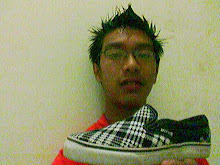STUDENTS in the lower level will experience a change in the school syllabus come January 2009, which will see a more flexible system of education that focuses on a more autonomous education.
This was highlighted during a dialogue session of the briefing orientation of the handing of documents, framework and guidelines of the 21st Century Education System (SPN21) to 209 participants consisting of principals, deputy principals and head of teachers from all over Brunei Darussalam.
According to the briefing presented by the Acting Director of Curriculum Development at the Ministry of Education (MOE), Ak Abdullah Pg Hj Tengah, students in the lower level will be experiencing a new and improved syllabus compared to the current curriculum that has been followed for the past few years.
Students studying in Year One to Year Four (formerly primary one and four) will become the first batch to experience the beginning of the implementation of the SPN21 in January 2009.
Comparisons between the current curriculum and the new system were discussed during the briefing where it was said that whereas the current curriculum offers 11 subjects, the new system will be based on 10 learning areas with each area catering to differentiated teaching methods to meet the needs of the students.
Under the new system, the subject Social Studies will be introduced, combining aspects of History and Geography.
Modular subjects will also be introduced such as Info-Communication Technology (ICT), Drawing and Design and finally, Music and Drama.
The learning focus and pedagogy will be emphasised on generic skills and the application of knowledge through project-based activities and role-playing which is hoped to induce critical thinking, enquiry learning, a more effective process of instruction and provide a holistic approach.
A video displaying schools in Brunei that are currently adapting to this transition was shown during the session.
Where the current syllabus sees a fixed and unchanged grade assessment process, the new system will offer constructive comments from peers and teachers during the assessment process to provide flexibility in awarding grades.
There will also be an introduction of intervention programmes in which literacy strategies will provide sufficient attention to developing oracy skills in the early stages of schooling and the numeracy strategy will provide greater emphasis on problem-solving and the use of ICT.
As for learning resources, special requirements such as providing laptops for work-group activities for students, Internet facilities and connectivity within the classrooms, LCD projectors for effective use of e-books mainly in Science and Mathematics subjects, were proposed.
The new education system also wants teachers to adopt the role as facilitators in the classrooms to ensure that the learning experience is coordinated according to the in-depth level of understanding of the students.
The system also prompts schools to be supportive of teachers in their endeavour to educate their students with technology-based tools and appropriate environment.
At the dialogue session, the acting director was accompanied by the acting assistant director of the curriculum development department, Hj Abdul Rahman Hj Nawi, and also present was Datin Paduka Apsah Hj Abdul Majid, MOE Permanent Secretary (Core Education), who was the mediator for the question-and-answer session.
Towards the end of the event, files and folders containing the guidelines and framework of SPN21 were handed out to the heads of schools so that they may pass the knowledge on to their teachers as part of the preparation for SPN21.
According to a representative from MOE, the full implementation of SPN21 will be complete by the year 2011.










No comments:
Post a Comment